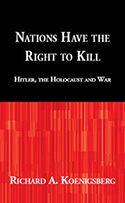Third chapter of Dynamics of Mass Murder
|
||||||||||||||
|
||||||||||||||
Hitler’s Official Programme (Feder, 1927/2013) inveighed against leaders of public life who worshipped “individualism” and whose sole incentive was “personal interest.” Goebbels contrasted the idealistic philosophy of National Socialism with the Jewish philosophy of “materialism and individualism.” Hitler stated in Mein Kampf (1924) that what was unique about the Aryan was his willingness to abandon self-interest and transcend egoism in the name of surrendering to the community. What was most developed in the Aryan, Hitler said, was the self-sacrificing will to “give one’s personal labor and if necessary one’s life for others. The Jew by contrast, Hitler said, represented the “mightiest counterpart to the Aryan.” Whereas Aryans willingly sacrifice for a community, in the Jewish people the will to sacrifice did not go beyond the “naked instinct of self-preservation.” The Jew lacked completely, according to Hitler, the most essential requirement for a cultured people: the “idealistic attitude.” The Jew’s “absolute absence of all sense of all sense of sacrifice” manifest itself as “cowardice.” This was the central template out of which the Final Solution evolved: Aryan or good German = willingness to sacrifice for a national community. Jew = unwillingness or inability to sacrifice for a national community. The penultimate form of sacrifice, according to Hitler, was willingness to die for a national community. Hitler defined nationalism as the willingness to act with a “boundless, all embracing love for the people” and if necessary to “die for it.” The Aryan, Hitler said, willingly subordinates his own ego to the life of the community, and if the hour demands “even sacrifices himself.” What it all came down to, finally, was Hitler’s belief that Aryan and Jew possessed radically different—opposing—viewpoints with regard to national self-sacrifice. The Aryan, Hitler imagined, was willing to die for a country; whereas Jews were incapable—or refused—to die for a country. |
||||||||||||||
